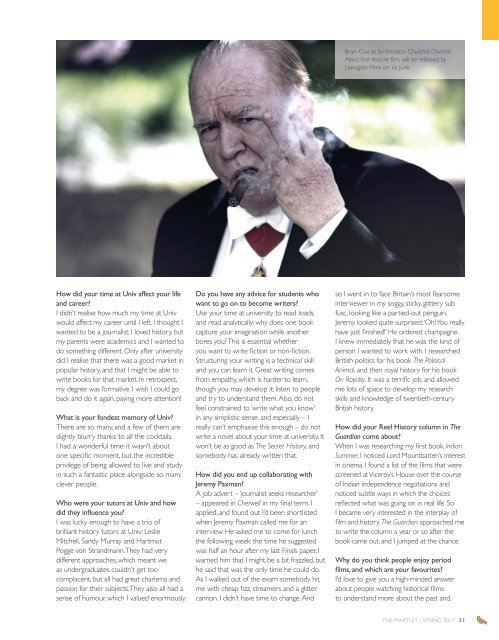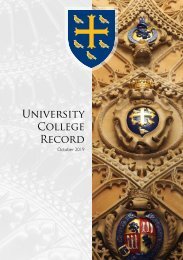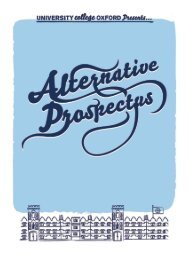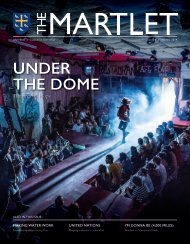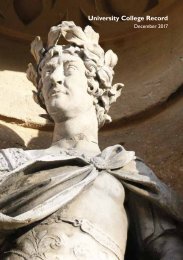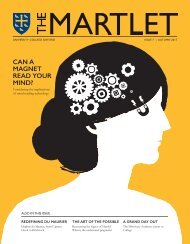Spring Martlet 2017
Spring Martlet 2017 V2
Spring Martlet 2017 V2
- No tags were found...
Create successful ePaper yourself
Turn your PDF publications into a flip-book with our unique Google optimized e-Paper software.
Brain Cox as Sir Winston Churchill. Churchill,<br />
Alex’s first feature film, will be released by<br />
Lionsgate Films on 16 June.<br />
How did your time at Univ affect your life<br />
and career?<br />
I didn’t realise how much my time at Univ<br />
would affect my career until I left. I thought I<br />
wanted to be a journalist: I loved history, but<br />
my parents were academics and I wanted to<br />
do something different. Only after university<br />
did I realise that there was a good market in<br />
popular history, and that I might be able to<br />
write books for that market. In retrospect,<br />
my degree was formative. I wish I could go<br />
back and do it again, paying more attention!<br />
What is your fondest memory of Univ?<br />
There are so many, and a few of them are<br />
slightly blurry thanks to all the cocktails.<br />
I had a wonderful time: it wasn’t about<br />
one specific moment, but the incredible<br />
privilege of being allowed to live and study<br />
in such a fantastic place alongside so many<br />
clever people.<br />
Who were your tutors at Univ and how<br />
did they influence you?<br />
I was lucky enough to have a trio of<br />
brilliant history tutors at Univ: Leslie<br />
Mitchell, Sandy Murray and Hartmut<br />
Pogge von Strandmann. They had very<br />
different approaches, which meant we<br />
as undergraduates couldn’t get too<br />
complacent, but all had great charisma and<br />
passion for their subjects. They also all had a<br />
sense of humour, which I valued enormously.<br />
Do you have any advice for students who<br />
want to go on to become writers?<br />
Use your time at university to read loads,<br />
and read analytically: why does one book<br />
capture your imagination while another<br />
bores you? This is essential whether<br />
you want to write fiction or non-fiction.<br />
Structuring your writing is a technical skill<br />
and you can learn it. Great writing comes<br />
from empathy, which is harder to learn,<br />
though you may develop it: listen to people<br />
and try to understand them. Also, do not<br />
feel constrained to ‘write what you know’<br />
in any simplistic sense, and especially – I<br />
really can’t emphasise this enough – do not<br />
write a novel about your time at university. It<br />
won’t be as good as The Secret History, and<br />
somebody has already written that.<br />
How did you end up collaborating with<br />
Jeremy Paxman?<br />
A job advert – ‘journalist seeks researcher’<br />
– appeared in Cherwell in my final term. I<br />
applied, and found out I’d been shortlisted<br />
when Jeremy Paxman called me for an<br />
interview. He asked me to come for lunch<br />
the following week: the time he suggested<br />
was half an hour after my last Finals paper. I<br />
warned him that I might be a bit frazzled, but<br />
he said that was the only time he could do.<br />
As I walked out of the exam somebody hit<br />
me with cheap fizz, streamers and a glitter<br />
cannon. I didn’t have time to change. And<br />
so I went in to face Britain’s most fearsome<br />
interviewer in my soggy, sticky, glittery sub<br />
fusc, looking like a partied-out penguin.<br />
Jeremy looked quite surprised: ‘Oh! You really<br />
have just finished!’ He ordered champagne.<br />
I knew immediately that he was the kind of<br />
person I wanted to work with. I researched<br />
British politics for his book The Political<br />
Animal, and then royal history for his book<br />
On Royalty. It was a terrific job, and allowed<br />
me lots of space to develop my research<br />
skills and knowledge of twentieth-century<br />
British history.<br />
How did your Reel History column in The<br />
Guardian come about?<br />
When I was researching my first book, Indian<br />
Summer, I noticed Lord Mountbatten’s interest<br />
in cinema. I found a list of the films that were<br />
screened at Viceroy’s House over the course<br />
of Indian independence negotiations and<br />
noticed subtle ways in which the choices<br />
reflected what was going on in real life. So<br />
I became very interested in the interplay of<br />
film and history. The Guardian approached me<br />
to write the column a year or so after the<br />
book came out, and I jumped at the chance.<br />
Why do you think people enjoy period<br />
films, and which are your favourites?<br />
I’d love to give you a high-minded answer<br />
about people watching historical films<br />
to understand more about the past and,<br />
THE MARTLET | SPRING <strong>2017</strong> 31


